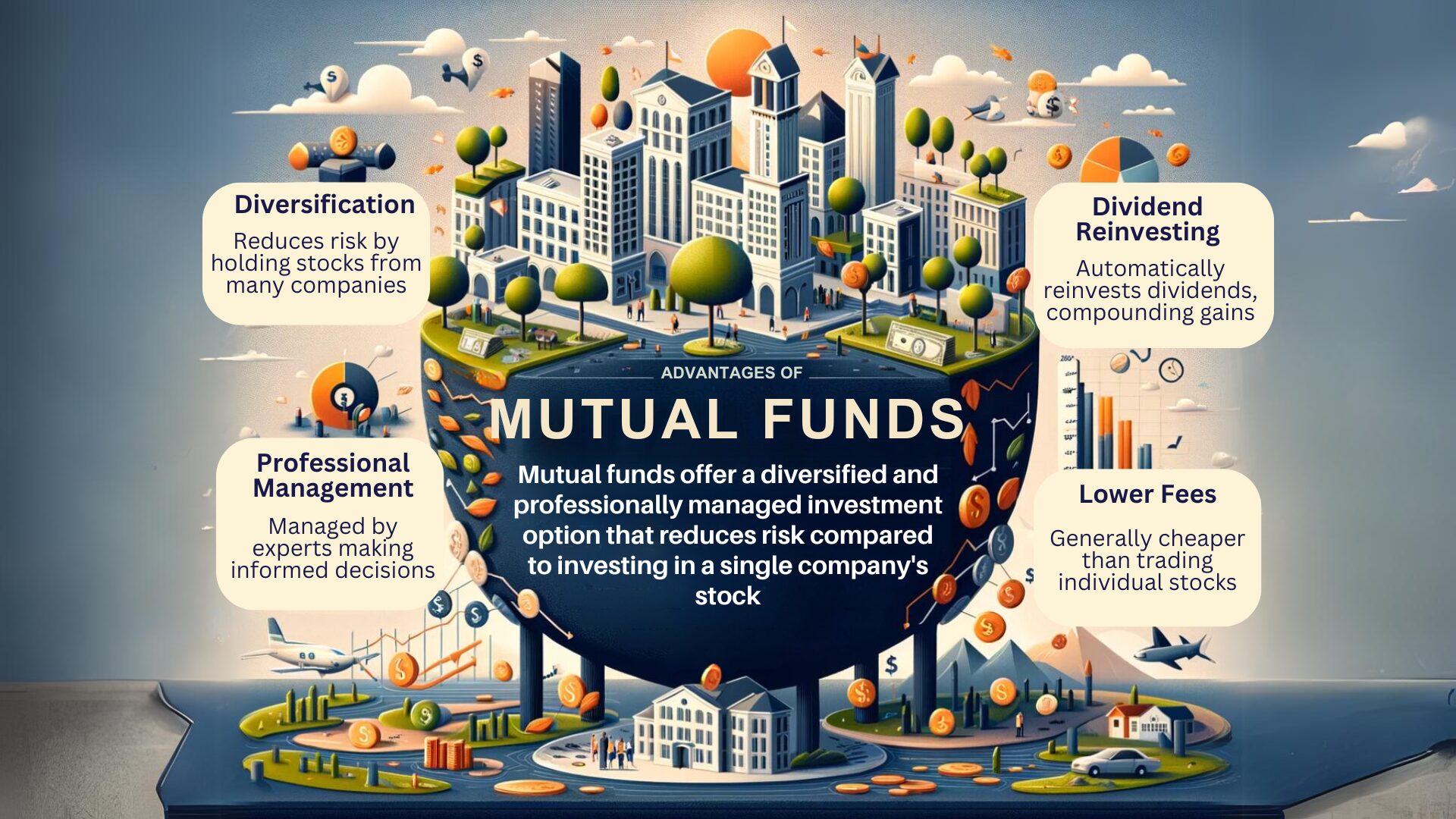Alright, let’s talk about setting yourself up for a wealthy retirement the smart way. We’re not chasing get-rich-quick schemes or playing with risky fads like crypto. That’s a one-way ticket to heartache. Safe investments that can’t even outpace inflation aren’t the answer either. Nope, the way to grow real wealth for retirement is through good old mutual funds.
Mutual funds have proven time and again to be a solid path to making your million(s) without all the stress and rollercoaster rides. But this only works if you know how to separating the winners from the duds. That’s what I’m going to cover here – how to pick mutual funds that will actually get you to your retirement goals.
Getting to Know Mutual Funds
Think of mutual funds kind of like dividing money amongst your family for pizza night. You all chip in some cash, pool it together and use that group fund to buy enough pizza for everyone to get their fill. That’s essentially how mutual funds work too.
Lots of different investors contribute money into the same pot. But instead of ordering Domino’s, professional fund managers take that combined cash and invest it in a diversified bundle of stocks and/or bonds from many different companies. By owning tiny slices of all those businesses, you get diversification that reduces your overall risk.
The Beauty of Mutual Funds
Having all your money tied up in a single company’s stock is way too risky. If that one business tanks, your investment is cooked. But with mutual funds holding stocks from dozens or even hundreds of different companies, you’re not overly exposed to any single one failing. The overall value of the fund can keep climbing as long as enough of those underlying investments are performing well.
And as a mutual fund’s total value increases over time, so do the returns for the investors in that fund. Not too shabby! But diversification and growth potential aren’t the only advantages of mutual funds:
– Professional money management (more on this in a bit)
– Automatic dividend reinvesting to compound your gains
– Lower overall fees than trading individual stocks
– One-stop diversification across many companies and sectors
With over $27 trillion invested across thousands of different mutual funds in the U.S. alone, there’s definitely no shortage of options out there. But separating the pretenders from the contenders? That takes some savvy analysis.

Click here to learn more and subscribe to the newsletter
What to Look For
When vetting potential mutual funds to invest in, you’ll want to closely review the fund’s objective, management team, sector diversification, performance history, costs, and turnover ratio. Let’s break those down:
Objective – This outlines the fund’s overall strategy and goals. I recommend balancing things out with a mix of growth/income (large, stable companies), growth (mid-size growth mode), aggressive growth (smaller/newer businesses), and international funds. Spreading across those four types gives you a solidly diversified base.
Management Experience – Unlike just throwing money into an index fund, mutual funds come with professional managers actively researching, strategizing, and calling the shots on your investments. You’ll want battle-tested veterans with 5-10+ years of proven skills. Would you want someone straight out of drivers’ ed taking the wheel on a road trip?
Sector Exposure – The different sectors and industries the fund invests in. Ideally, you want broad diversification across many different sectors so your returns don’t live or die based on how a single industry is faring that year.
Performance – Here’s where you separate the stallions from the donkeys. Look at the fund’s long-term track record of returns over 10+ year periods. If you invest $800/month from ages 35-65 in funds earning 10% annual returns, you’re looking at around $1.8 million at retirement. 11% returns? $2.2 million. And if those funds can hit 12% average annual returns, you’re set for $2.8 million! Those are life-changing numbers from just a reasonable monthly investment.
Costs – Watch out for funds loading you up with high fees that eat away at your growth. Front-end load funds are ideal – you pay upfront commissions, but then your money isn’t getting nibbled by ongoing high expense ratios over 1%. Those commissions cover the expertise of your financial advisor who is researching and recommending the right investments for your needs.
Turnover Ratio – This reflects how frequently the fund managers are buying and selling investments. A relatively low ratio under 10% shows they have conviction in their current holdings. Much higher, and it could signal indecisive management constantly readjusting and racking up extra transaction costs. For taxable brokerage accounts, high turnover also creates a bigger tax headache each year.

Stick to the Proven Path
Once you’ve got your portfolio set with a properly balanced mix of good mutual funds, the hardest step is resisting the urge to panic or constantly tinker with things. Markets ebb and flow, sometimes disturbingly. But history shows the positive lasting trajectory always returns if you have the patience to stick it out.
Don’t Get Spooked
Don’t drive yourself crazy checking your accounts every day or flipping on the financial shows full of doomsday rhetoric designed to scare you. The media loves stoking fears because it gets eyeballs, but reacting emotionally is the surest way to make poor investment decisions. Take a deep breath, log out, and go enjoy your life.
Trust the Process
You’re investing for the long game here, not attempting to time the market or cash in on short-term fluctuations. Trust the proven process – make those monthly contributions, tune out the noise, and before you know it, you’ll be the one living out that millionaire retirement we all dream about.
It takes diligence and discipline, but staying patient and sticking to the plan will allow those mutual fund investments to grow into a multimillion-dollar nest egg for your golden years. Don’t just take a gamble on your family’s financial future. Do the research, invest wisely in good mutual funds, and you can retire wealthy the smart way, without the stress and uncertainty of riskier get-rich-quick schemes. Sustained, consistent investing in well-vetted mutual funds is how fortunes are truly built over time.
Get your free guide “Passive Real Estate Investing For Busy Professionals”
Conclusion
In the end, building a retirement portfolio with the right mutual funds is one of the smartest and most proven paths to long-term wealth. By taking the time to analyze the fund objectives, management team, sector diversification, performance history, costs, and turnover ratios, you can separate the winners from the duds. Maintain a mix across growth/income, growth, aggressive growth, and international funds, and you’ll have a solidly diversified base to compound returns over decades.
It takes diligence and discipline, but staying patient and sticking to the plan will allow those mutual fund investments to grow into a multimillion-dollar nest egg for your golden years. Don’t just take a gamble on your family’s financial future. Do the research, invest wisely in good mutual funds, and you can retire wealthy the smart way, without the stress and uncertainty of riskier get-rich-quick schemes. Sustained, consistent investing in well-vetted mutual funds is how fortunes are truly built over time.
Interested in multifamily real estate investing? Our experienced team is here to help. From market research to identifying the best opportunities, we guide you through the process. Subscribe to our YouTube channel for informative videos and expert discussions, and follow us on Instagram for exclusive content. Explore our comprehensive Udemy course for detailed insights and strategies. Ready to elevate your investment journey? Contact us now to schedule a consultation and achieve your financial goals in real estate.
*This content is for informational purposes only and is not intended as financial or legal advice. Please consult with a professional advisor before making any investment decisions.




























